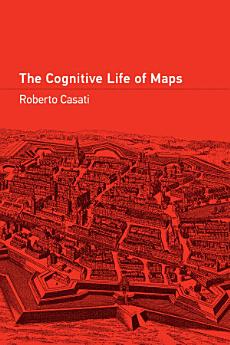The Cognitive Life of Maps
May 2024 · MIT Press
Ebook
256
Pages
family_home
Eligible
info
reportRatings and reviews aren’t verified Learn More
About this ebook
The “mapness of maps”—how maps live in interaction with their users, and what this tells us about what they are and how they work.
In a sense, maps are temporarily alive for those who design, draw, and use them. They have, for the moment, a cognitive life. To grapple with what this means—to ask how maps can be alive, and what kind of life they have—is to explore the core question of what maps are. And this is what Roberto Casati does in The Cognitive Life of Maps, in the process assembling the conceptual tools for understanding why maps have the power they have, why they are so widely used, and how we use (and misuse) them.
Drawing on insights from cognitive science and philosophy of mind, Casati considers the main claims around what maps are and how they work—their specific syntax, peculiar semantics, and pragmatics. He proposes a series of steps that can lead to a precise theory of maps, one that reveals what maps have in common with diagrams, pictures, and texts, and what makes them different. This minimal theory of maps helps us to see maps nested in many cognitive artifacts—clock faces, musical notation, writing, calendars, and numerical series, for instance. It also allows us to tackle the issue of the territorialization of maps—to show how maps can be used to draw specific spatial inferences about territories. From the mechanics of maps used for navigation to the differences and similarities between maps and pictures and models, Casati's ambitious work is a cognitive map in its own right, charting the way to a new understanding of what maps mean.
In a sense, maps are temporarily alive for those who design, draw, and use them. They have, for the moment, a cognitive life. To grapple with what this means—to ask how maps can be alive, and what kind of life they have—is to explore the core question of what maps are. And this is what Roberto Casati does in The Cognitive Life of Maps, in the process assembling the conceptual tools for understanding why maps have the power they have, why they are so widely used, and how we use (and misuse) them.
Drawing on insights from cognitive science and philosophy of mind, Casati considers the main claims around what maps are and how they work—their specific syntax, peculiar semantics, and pragmatics. He proposes a series of steps that can lead to a precise theory of maps, one that reveals what maps have in common with diagrams, pictures, and texts, and what makes them different. This minimal theory of maps helps us to see maps nested in many cognitive artifacts—clock faces, musical notation, writing, calendars, and numerical series, for instance. It also allows us to tackle the issue of the territorialization of maps—to show how maps can be used to draw specific spatial inferences about territories. From the mechanics of maps used for navigation to the differences and similarities between maps and pictures and models, Casati's ambitious work is a cognitive map in its own right, charting the way to a new understanding of what maps mean.
About the author
Roberto Casati is Director of the Jean Nicod Institute and Professor at EHESS (School of Advanced Studies in the Social Sciences) in Paris. He is the coauthor of The Visual World of Shadows, Parts and Places, and Holes and Other Superficialities (all MIT Press).
Rate this ebook
Tell us what you think.
Reading information
Smartphones and tablets
Install the Google Play Books app for Android and iPad/iPhone. It syncs automatically with your account and allows you to read online or offline wherever you are.
Laptops and computers
You can listen to audiobooks purchased on Google Play using your computer's web browser.
eReaders and other devices
To read on e-ink devices like Kobo eReaders, you'll need to download a file and transfer it to your device. Follow the detailed Help Center instructions to transfer the files to supported eReaders.




